Why Dajue Mountain Should Be Your Next Travel Destination in China
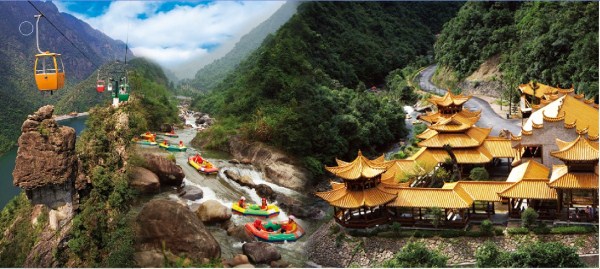
An Essential Guide to Visiting Dajue Mountain
In This Guide
- An Essential Guide to Visiting Dajue Mountain
- The Rich History and Legends of Dajue Mountain
- Main Highlights: What You Absolutely Can’t Miss
- Planning Your Visit: A Practical Guide
- Tickets: Prices, Booking, and Tips
- How to Get There: A Complete Transportation Guide
- Local Cuisine and Accommodation Nearby
- Frequently Asked Questions
- Final Thoughts on Your Trip
Nestled in the serene embrace of Jiangxi province, Dajue Mountain (抚州大觉山) presents a captivating blend of natural beauty and cultural heritage, making it an essential destination for travelers seeking both adventure and tranquility. This majestic mountain, which translates to “Great Awakening Mountain,” is a sanctuary for those interested in Buddhism, history, and the great outdoors.
A Journey Through Time and Nature
Dajue Mountain is steeped in rich history, dating back to the Tang dynasty when the famous Dajue Temple was established. This temple, an architectural marvel, serves as a tranquil retreat surrounded by lush forests, inviting visitors to meditate and reflect in its peaceful atmosphere. The area boasts stunning waterfalls, clear streams, and diverse flora and fauna, creating an ideal backdrop for hiking and exploration.
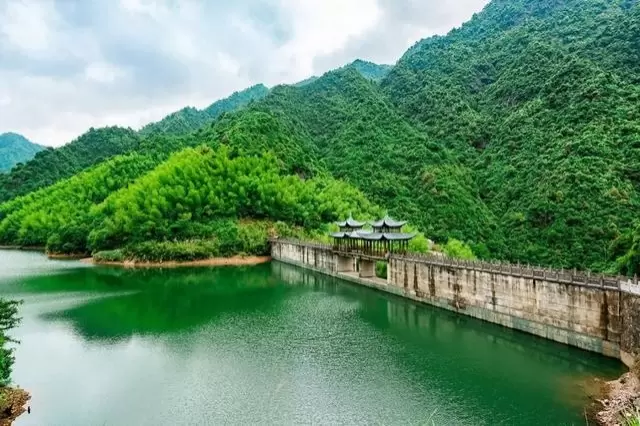
Dajue Mountain.
Outdoor Adventures Await
For the more adventurous traveler, Dajue Mountain offers thrilling opportunities such as rock climbing and cave exploration. The extensive network of hiking trails reveals breathtaking vistas and the chance to immerse oneself in the region’s vibrant ecosystem. The mountain is divided into two distinct districts: the East District, characterized by its primitive forests, and the West District, which combines religious culture with exhilarating activities like canyon rafting.
Getting There and Around
Reaching Dajue Mountain is straightforward. The journey from the capital of Jiangxi, Nanchang, takes approximately 3.5 hours by car. Once you arrive, a well-organized shuttle bus system and a scenic cableway facilitate access to various attractions, including the iconic Dajue Peak, which resembles the enlightened Sakyamuni.
Best Times to Visit
The best time to visit Dajue Mountain is during the spring and autumn months when the weather is mild and the landscapes are particularly vibrant. Regardless of when you choose to visit, the harmonious blend of nature and culture at Dajue Mountain promises a refreshing and rejuvenating experience.
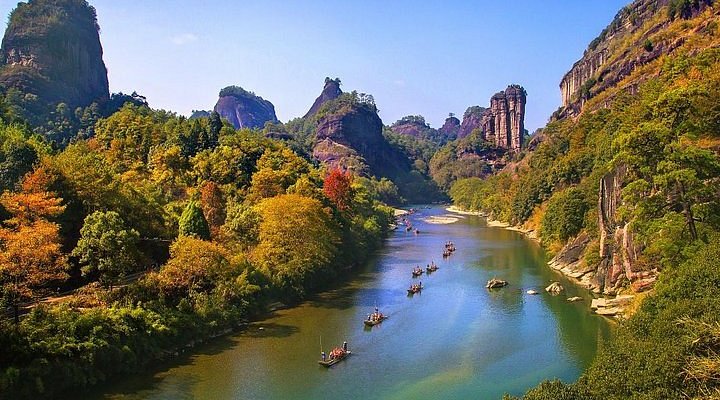
Dajue Mountain.
In summary, whether you seek spiritual solace, outdoor adventure, or a deeper understanding of Chinese history and culture, Dajue Mountain is a hidden gem waiting to be explored. Prepare to be enchanted by its breathtaking scenery and tranquil ambiance—your journey to enlightenment begins here.
The Rich History and Legends of Dajue Mountain
Unveiling the Rich Tapestry of Dajue Mountain’s History and Legends
Nestled in the picturesque Zixi County of Jiangxi Province, Dajue Mountain (抚州大觉山) is not merely a natural wonder but a storied landscape steeped in history and legend. This enchanting site has captured the imagination of explorers, pilgrims, and history enthusiasts for centuries, making it a vital part of China’s cultural heritage.
Historical Significance
Ancient Temples and Monastic Traditions
The heart of Dajue Mountain is undoubtedly the ancient Dajue Temple, a serene sanctuary established during the Tang Dynasty (618-907 AD). This temple is not just a relic of the past; it represents the enduring legacy of Buddhist practices in the region. The temple is enveloped by lush forests, providing a tranquil atmosphere conducive to meditation and spiritual reflection. This sacred site has drawn monks and devotees for generations, eager to partake in its peaceful ambiance and deep-rooted spirituality.
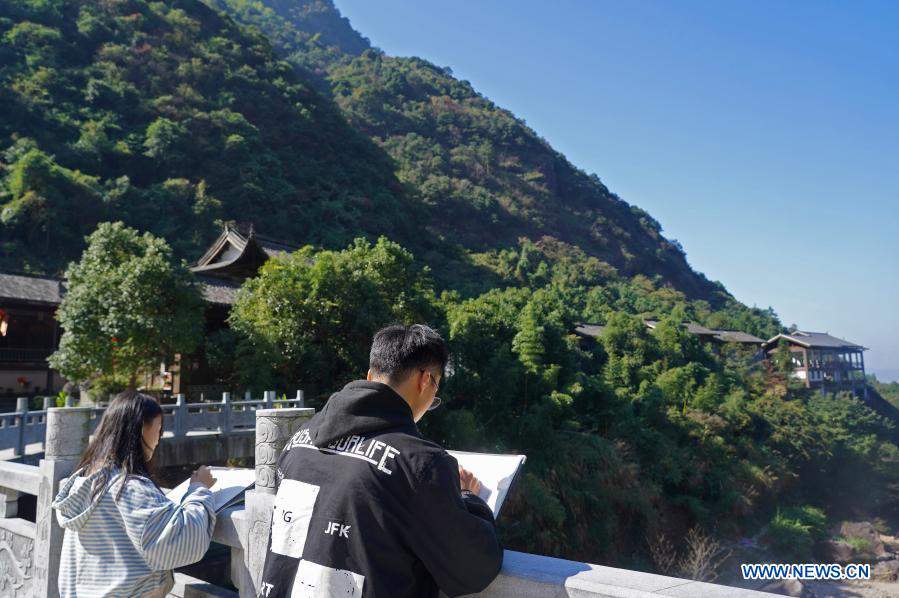
Dajue Mountain.
Cultural Hub
Dajue Mountain is also recognized as a significant cultural park, embodying the philosophy of enlightenment in Buddhism. The name “Dajue” translates to “Great Enlightenment,” symbolizing the quest for spiritual awakening. The mountain itself is said to resemble the enlightened Buddha, Sakyamuni, further enhancing its cultural importance. Over time, it has become a pilgrimage site where individuals seek wisdom and enlightenment, fostering a unique blend of nature and spirituality.
Legends of Dajue Mountain
The Guardian Spirits
Legend has it that Dajue Mountain is home to various guardian spirits that protect the land and its visitors. Local folklore speaks of benevolent deities who reside in the mountain’s caves and peaks, ensuring the harmony of nature and the well-being of those who tread upon its sacred ground. These tales have been passed down through generations, adding a mystical layer to the mountain’s allure.
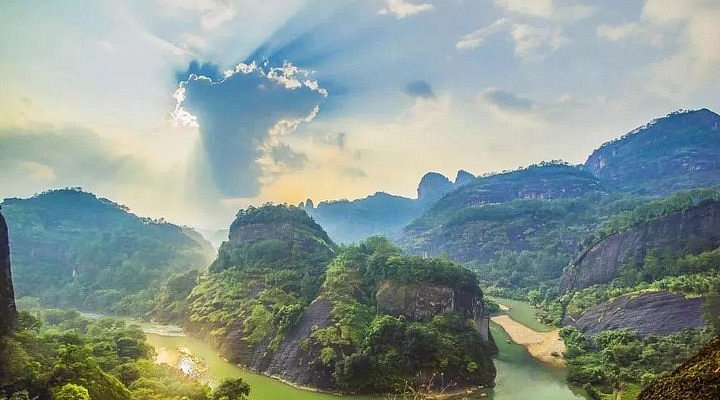
Dajue Mountain.
The Nine Heavens
Another captivating legend associated with Dajue Mountain is the concept of the “Nine Heavens.” According to local lore, the mountain is a gateway to celestial realms, each representing different aspects of spiritual enlightenment. Visitors often seek to traverse these realms through the various trails and scenic spots scattered throughout the area. This narrative invites travelers to explore not only the physical landscape but also their spiritual journeys.
Nature and Adventure
Dajue Mountain is not only rich in history and mythology but also boasts stunning natural beauty. Its diverse flora and fauna, coupled with dramatic landscapes, offer excellent opportunities for hiking, rock climbing, and exploration. The scenic trails weave through ancient forests, cascading waterfalls, and breathtaking vistas, ensuring that every step taken is a communion with nature.
Conclusion
Dajue Mountain serves as a testament to the intricate relationship between nature, history, and spirituality in Chinese culture. Its ancient temples, rich legends, and stunning landscapes create an immersive experience for international travelers seeking both adventure and a deeper understanding of China’s cultural heritage. Whether you are drawn by the allure of its historical significance or the tranquility of its natural beauty, Dajue Mountain is a captivating destination that promises to inspire and rejuvenate.
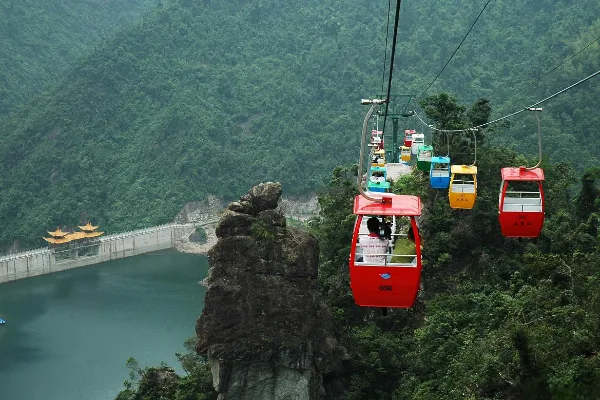
Dajue Mountain.
Main Highlights: What You Absolutely Can’t Miss
Discover the Enchantment of Dajue Mountain
Dajue Mountain (抚州大觉山) is not just a destination; it is a journey into the heart of natural beauty and spiritual tranquility. Nestled in the northwestern corner of Jiangxi Province, this captivating site offers a unique blend of stunning landscapes, rich history, and cultural experiences that are sure to leave an indelible mark on any traveler. Here are the highlights that you absolutely cannot miss during your visit.
1. Dajue Temple
At the heart of Dajue Mountain lies the ancient Dajue Temple, a serene sanctuary dating back to the Tang Dynasty (618-907 AD). This temple is not only an architectural marvel but also a spiritual haven, surrounded by lush forests that invite meditation and reflection. Whether you are seeking peace or simply want to appreciate the intricate details of its design, a visit to the temple is essential.
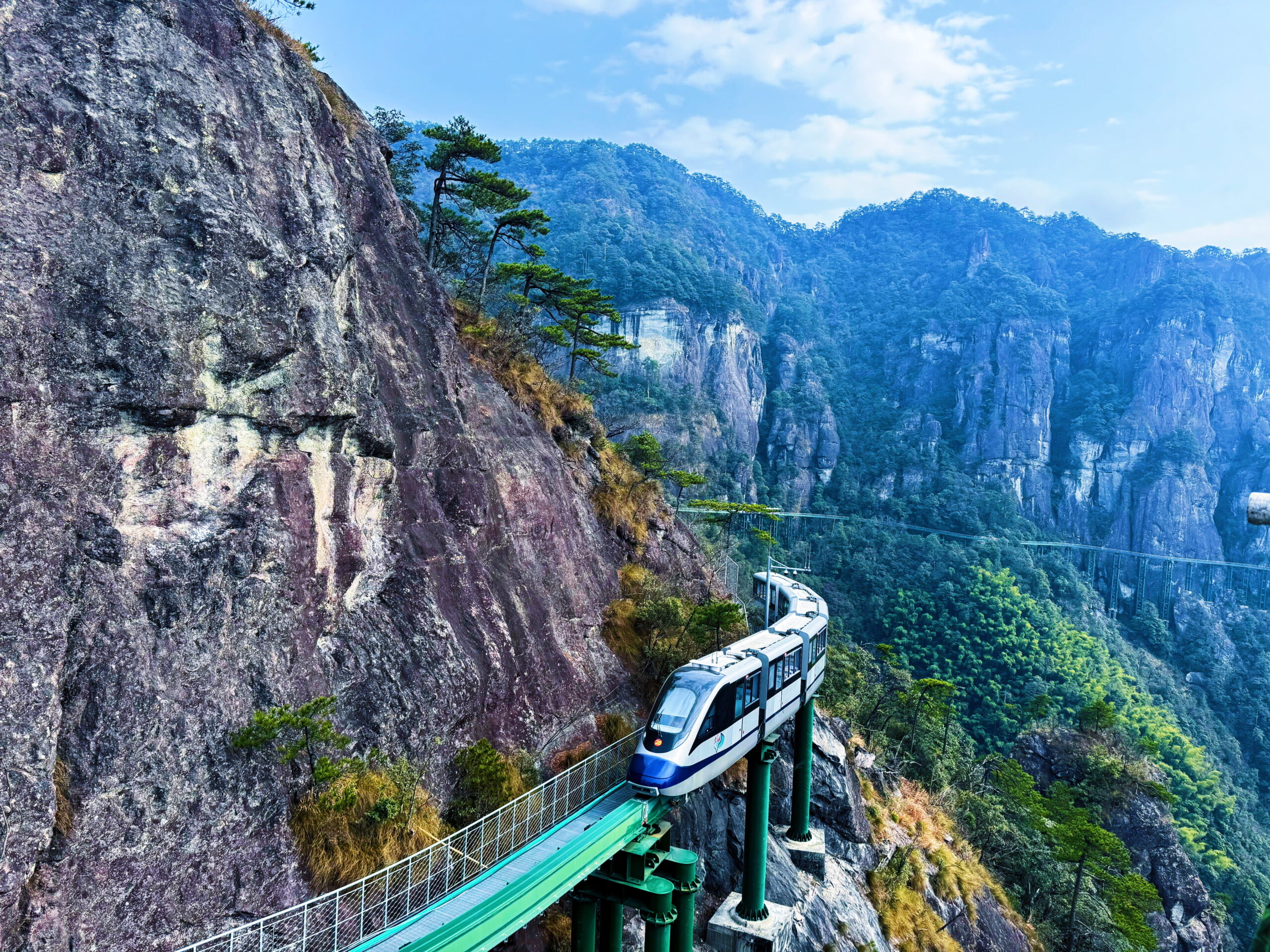
Dajue Mountain.
2. Breathtaking Hiking Trails
For those who enjoy the great outdoors, Dajue Mountain boasts an extensive network of hiking trails that meander through pristine forests, offering breathtaking views at every turn. As you hike, you may encounter various waterfalls and clear streams, immersing you in the region’s natural beauty. The trails cater to all levels of hikers, providing opportunities for both leisurely walks and more challenging treks.
3. Dajue Peak
A highlight of the mountain is Dajue Peak, the highest point in the area, which resembles the enlightened figure of Sakyamuni, the Buddha. Reaching the summit rewards you with panoramic views of the surrounding landscape, making it a perfect spot for photography and contemplation. The experience of standing atop Dajue Peak, with its spiritual significance and awe-inspiring vistas, is one that travelers will cherish.
4. Adventure Activities
For the adventurous spirit, Dajue Mountain offers thrilling activities such as rock climbing and exploring the various caves dotted throughout the area. The newly built single-track vehicle ride provides an exhilarating way to traverse the mountain, with stops along the way to experience the local ecology firsthand. This blend of adventure and natural beauty encapsulates the essence of Dajue Mountain.
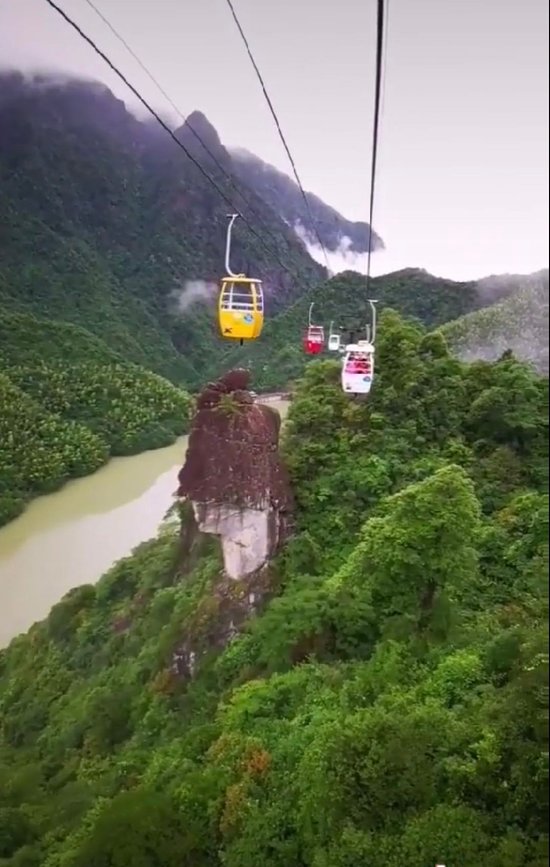
Dajue Mountain.
5. Nine Heavens Scenic Area
The Nine Heavens landscape is a spectacular feature of Dajue Mountain. This area includes heavenly lakes, pavilions, and sky bridges, all connected by a well-designed tour loop that allows visitors to appreciate the diverse beauty of the mountain. Each stop along the loop offers unique views and experiences, making it a highlight of any visit.
6. Cultural Immersion
Dajue Mountain is steeped in Buddhist and Taoist traditions, evident in the numerous temples and shrines scattered throughout the area. Engaging with the local culture, whether through temple visits or participation in traditional ceremonies, enriches your understanding of this beautiful region’s heritage.
7. Wildlife and Flora
The diverse ecosystem of Dajue Mountain is home to a variety of flora and fauna, making it an excellent destination for nature enthusiasts. Birdwatching and botanical exploration are popular activities, allowing visitors to connect with the natural world in a tranquil setting.
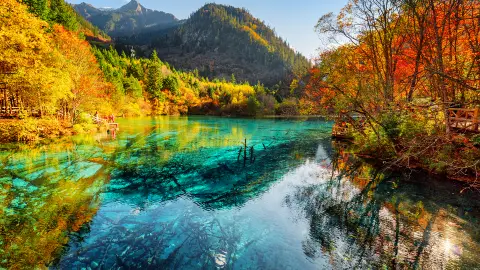
Dajue Mountain.
8. Seasonal Beauty
Dajue Mountain transforms with the seasons, offering unique experiences throughout the year. Spring brings vibrant blossoms, summer showcases lush greenery, autumn presents a spectacular display of colorful foliage, and winter offers a serene, snow-dusted landscape. Each season provides a different perspective on this beautiful destination.
Conclusion
Dajue Mountain is a true gem in Jiangxi Province, combining natural beauty, adventure, and rich cultural history. Whether you are seeking a peaceful retreat, an adventurous excursion, or a deep dive into Chinese spirituality, Dajue Mountain promises an unforgettable experience that will resonate long after your visit. Don’t miss the opportunity to explore this enchanting destination!

Dajue Mountain.
Planning Your Visit: A Practical Guide
Discovering Dajue Mountain: Your Essential Travel Guide
Nestled in the northwestern part of Jiangxi Province, Dajue Mountain (抚州大觉山) is a serene retreat that offers a blend of natural beauty, rich cultural heritage, and spiritual tranquility. This guide will help you navigate your visit to this hidden gem, ensuring a fulfilling experience steeped in history and nature.
Getting There
Transportation Options:
– By Air: The nearest major airport is Nanchang Changbei International Airport (KHN), approximately 3.5 hours away by car.
– By Train: From Shanghai or other major cities, take a train to Fuzhou (the capital of Jiangxi Province). From Fuzhou, you can catch a local bus or taxi to Zixi County, the gateway to Dajue Mountain.
– By Car: If you prefer driving, renting a car is a great option. The roads are well-maintained, and you’ll enjoy the scenic landscapes along the way.
Accommodation
While Dajue Mountain offers limited accommodation options directly on-site, nearby Zixi County provides various hotels and guesthouses catering to different budgets. When planning your stay, consider:
– Local Hotels: Look for options in Zixi County for a convenient base.
– Guesthouses: For a more immersive experience, consider staying in a locally-run guesthouse to enjoy authentic hospitality.

Dajue Mountain.
Best Time to Visit
The ideal time to explore Dajue Mountain is during the spring (March to May) and autumn (September to November) months, when the weather is mild, and the natural scenery is at its most vibrant. However, each season offers a unique charm:
– Spring: Blooming flowers and lush greenery.
– Summer: Cooler mountain air and vibrant wildlife.
– Autumn: Stunning fall foliage.
– Winter: A tranquil, snow-dusted landscape perfect for reflection.
Notable Attractions
Dajue Temple:
Dating back to the Tang Dynasty, this ancient temple is the centerpiece of Dajue Mountain. Its serene ambiance, surrounded by lush forests, makes it an ideal spot for meditation and relaxation.
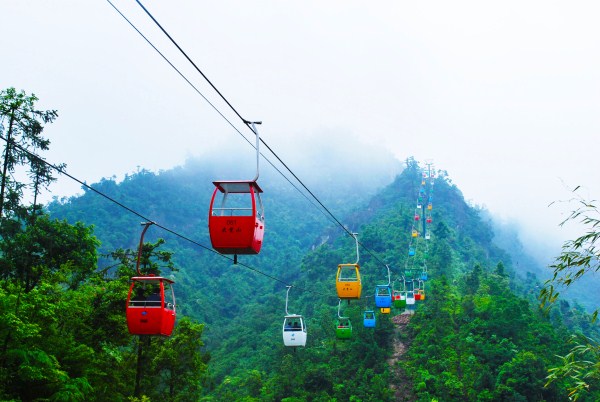
Dajue Mountain.
Natural Wonders:
– Waterfalls and Streams: Explore the pristine waterfalls and clear streams that dot the landscape.
– Hiking Trails: Numerous trails offer breathtaking views and opportunities to immerse yourself in nature. The trails vary in difficulty, catering to both casual hikers and seasoned adventurers.
Adventure Activities:
For thrill-seekers, Dajue Mountain presents opportunities for rock climbing, cave exploration, and rafting in the nearby canyons.
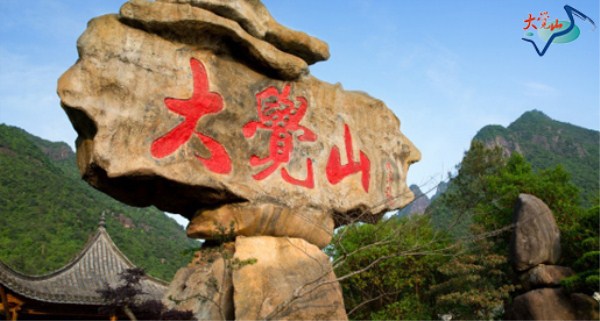
Dajue Mountain.
Practical Tips
- Entrance Fee: There may be an entrance fee to access certain areas of the mountain and temple. Check local listings or inquire at your accommodation.
- Opening Hours: The Dajue Temple generally operates from 8:00 AM to 5:00 PM daily, making it convenient for a full day of exploration.
- What to Bring: Comfortable hiking shoes, a refillable water bottle, and a camera to capture the stunning landscapes.
Local Cuisine
Don’t miss the chance to savor local Jiangxi cuisine during your visit. Popular dishes include:
– Nanchang Rice Noodles: A deliciously spicy noodle dish, perfect after a day of hiking.
– Wontons: A local specialty that can be found in many eateries around Zixi County.
Final Thoughts
Dajue Mountain is not just a destination; it’s an experience that combines the tranquility of nature with the depth of Chinese culture and spirituality. Whether you seek adventure, relaxation, or cultural enrichment, this enchanting mountain offers something for every traveler. Plan your visit today and uncover the wonders of Dajue Mountain!
Tickets: Prices, Booking, and Tips
Ticket Information for Dajue Mountain
Visiting Dajue Mountain (抚州大觉山) promises a serene escape into nature, enriched by the area’s rich cultural heritage. Here’s everything you need to know about ticket prices, booking options, and valuable tips to make your visit as seamless as possible.
Ticket Prices
- General Admission: Approximately ¥60 (CNY) per person.
- Discounted Tickets: Reduced prices are available for students and seniors, typically around ¥30 (CNY). Always carry valid identification to avail these discounts.
- Group Rates: If you’re traveling in a group (usually 10 or more), inquire at the ticket counter about possible group rates to save on overall costs.
Booking Options
- On-Site Purchase: Tickets can be purchased directly at the entrance to Dajue Mountain. This is the most straightforward option, especially for spontaneous visits.
- Online Reservations: For those who prefer to plan ahead, tickets can often be booked through popular travel platforms or the official Dajue Mountain website. Booking online may also allow you to skip the ticket queue, especially during peak seasons.
- Travel Packages: Many travel agencies offer packages that include entrance fees along with guided tours, transportation, and sometimes meals. This can be a great way to enhance your experience while learning about the area’s history and culture.
Visiting Hours
Dajue Mountain is open daily from 8:00 AM to 5:00 PM. To make the most of your visit, consider arriving early to enjoy the peaceful morning atmosphere and avoid larger crowds.
Tips for Your Visit
- Plan for Weather: The mountain region can experience varying weather conditions. It’s advisable to check the forecast and dress in layers, as temperatures can fluctuate significantly throughout the day.
- Explore the Trails: Take advantage of the extensive hiking trails that wind through the lush forests. Many of these trails offer breathtaking views and a chance to connect with nature intimately.
- Stay Hydrated: Bring water and snacks, especially if you plan to hike. There are limited facilities on the trails, so it’s important to be prepared.
- Photography: Don’t forget your camera! The scenic landscapes and ancient temples present countless opportunities for stunning photographs.
- Respect Nature and Culture: As you enjoy the beauty of Dajue Mountain, remember to respect the natural environment and the cultural significance of the temples and sites you visit.
With its tranquil beauty and rich history, Dajue Mountain is a destination that promises not just adventure, but also peace and reflection. Ensure you’re well-prepared to fully enjoy this hidden gem in Jiangxi Province!
How to Get There: A Complete Transportation Guide
Getting to Dajue Mountain: Your Comprehensive Transportation Guide
Nestled in the lush landscapes of Jiangxi Province, Dajue Mountain (抚州大觉山) is a serene retreat that beckons travelers with its ancient temples and natural beauty. Here’s how to navigate your way to this tranquil destination.
1. Arriving by Air
The nearest major airport to Dajue Mountain is Nanchang Changbei International Airport (KHN), located approximately 160 kilometers away. Here’s how to proceed:
- From Nanchang Airport:
- By Train: Take a high-speed train from Nanchang West Railway Station to Fuzhou (Jiangxi) Station. The journey takes about 1.5 to 2 hours. Once in Fuzhou, you can catch a bus or taxi to Zixi County, where Dajue Mountain is located.
- By Bus: Direct buses from the airport can take you to Fuzhou city center, where you can transfer to a bus heading to Zixi County.
2. Traveling by Train
China’s extensive railway network makes train travel an efficient option.
- From Major Cities:
- Shanghai: Board a high-speed train from Shanghai Hongqiao Railway Station to Fuzhou (Jiangxi) Station. The journey lasts around 4 hours. After arriving, take a local bus or taxi to Zixi County.
- Beijing: A similar route can be taken from Beijing to Fuzhou, with various train options available. Expect the travel time to be around 10 hours, depending on the train type.
3. Buses and Local Transport
Once you arrive in Fuzhou, local buses and taxis provide access to Zixi County, from where Dajue Mountain is easily reachable.
- Buses: Frequent bus services operate from Fuzhou’s main bus terminal to Zixi County. The ride takes approximately 3 hours.
- Taxis: For a more direct route, taxis or ride-sharing services are available, though they can be more expensive.
4. Driving to Dajue Mountain
For those who prefer the flexibility of driving:
- Car Rentals: Rent a car from Nanchang or Fuzhou. The drive to Dajue Mountain from Nanchang takes about 3.5 hours, while from Fuzhou it takes approximately 2.5 hours. Follow local signs to Zixi County, and then to the mountain area.
5. On-Site Transportation
Dajue Mountain features a well-organized transport system once you arrive:
- Shuttle Buses: The area offers shuttle buses that operate between key attractions, including the Dajue Temple and scenic viewpoints.
- Walking Trails: Explore the breathtaking natural beauty via designated walking trails that wind through the lush forests and offer stunning views of waterfalls and cliffs.
Tips for Your Journey
- Plan Ahead: Check train and bus schedules in advance, especially during peak tourist seasons.
- Language Barrier: While major transportation hubs have English signage, learning a few basic Mandarin phrases can enhance your travel experience.
- Tickets: Train tickets can be purchased online via platforms like Trip.com or at the station. For buses, tickets are usually bought on-site.
Dajue Mountain awaits with its tranquil ambiance and rich cultural heritage, making the journey well worth the effort. Enjoy your travels!
Local Cuisine and Accommodation Nearby
Nestled in the serene landscapes of Jiangxi province, Dajue Mountain not only offers breathtaking natural beauty and cultural richness but also a delightful culinary experience and accommodation options that enhance your visit. Here’s a guide to savoring local flavors and finding a comfortable place to stay during your exploration of this enchanting area.
Local Cuisine
When visiting Dajue Mountain, indulging in local cuisine is a must. The region is known for its fresh ingredients and traditional cooking methods, offering a taste of Jiangxi’s culinary heritage.
-
Hakka Cuisine: The nearby Hakka community is famous for its hearty dishes. Hakka salted chicken and braised pork with preserved vegetables are local favorites that reflect the robust flavors characteristic of the area.
-
Bamboo Shoots: In spring, the tender bamboo shoots are harvested and featured in many dishes. Enjoy them stir-fried or in soups, often accompanied by rice or noodles.
-
River Fish: The mountain’s streams are rich with freshwater fish. Dishes like grilled fish with chili sauce or steamed fish with ginger highlight the local catch and are typically served with a side of fresh vegetables.
-
Fried Rice with Seasonal Vegetables: A simple yet flavorful dish, this fried rice is often made with locally grown vegetables, showcasing the region’s agricultural bounty.
Dining Recommendations
While exploring the area, consider dining at:
-
Dajue Mountain Restaurant: This spot offers a range of local dishes with a focus on Hakka cuisine. The setting provides beautiful views of the surrounding forest, making it a perfect meal stop after a day of hiking.
-
Local Stalls: Don’t miss the chance to sample street food from local vendors, especially during weekends when they offer unique snacks like rice cakes and dumplings.
-
Temple Tea House: Located near the Dajue Temple, this tea house serves traditional Chinese teas and light snacks, providing a tranquil environment for relaxation.
Accommodation Nearby
To make the most of your stay at Dajue Mountain, a variety of accommodation options are available nearby that cater to different tastes and budgets.
-
Dajue Mountain Hotel: This is the most convenient option, located close to the entrance of the scenic area. The hotel offers comfortable rooms with stunning views of the mountains, along with amenities like a restaurant and guided tour services.
-
Local Guesthouses: For a more authentic experience, consider staying at one of the local guesthouses. These family-run accommodations provide cozy rooms and often serve homemade meals, giving you a taste of local hospitality.
-
Eco-Resorts: If you prefer a more immersive nature experience, there are eco-friendly resorts located on the outskirts of the mountain. These resorts typically offer rustic accommodations and outdoor activities, such as guided hikes and birdwatching tours.
-
B&Bs: Several charming bed and breakfast options are available in the nearby towns, providing a comfortable home base with personalized service. Many B&Bs feature traditional decor and offer breakfast made from locally sourced ingredients.
Conclusion
Whether you are savoring the rich flavors of Hakka dishes or resting in a cozy guesthouse, your experience at Dajue Mountain will be enriched by the region’s culinary delights and warm accommodations. Embrace the tranquility of this hidden gem while indulging in the local culture and hospitality that Jiangxi has to offer.
Frequently Asked Questions
Frequently Asked Questions about Dajue Mountain
1. What is Dajue Mountain known for?
Dajue Mountain, located in Jiangxi Province’s Zixi County, is renowned for its stunning natural beauty, rich biodiversity, and significant cultural heritage. The area is home to the ancient Dajue Temple, lush forests, scenic waterfalls, and various adventure activities such as hiking, rock climbing, and canyon rafting.
2. How do I get to Dajue Mountain?
To reach Dajue Mountain, you can travel by train or bus from major cities like Nanchang or Fuzhou. The closest city is Nanchang, which is approximately 3.5 hours away by car. Once in Zixi County, local transportation options such as taxis or shuttle buses are available to take you to the mountain.
3. What are the best times to visit Dajue Mountain?
The ideal time to visit Dajue Mountain is during the spring (March to May) and autumn (September to November) seasons when the weather is mild, and the natural scenery is at its most picturesque. Summers can be hot and humid, while winters may bring chilly temperatures.
4. Are there any accommodations near Dajue Mountain?
Yes, there are several accommodation options available in and around Zixi County, ranging from hotels to guesthouses. It is advisable to book in advance, especially during peak tourist seasons, to secure a comfortable stay.
5. What should I wear while visiting Dajue Mountain?
Dress in comfortable clothing suitable for outdoor activities, including sturdy hiking shoes. Layers are recommended, as temperatures can vary throughout the day. Don’t forget essentials such as sunscreen, a hat, and insect repellent.
6. Are there guided tours available at Dajue Mountain?
Yes, various guided tours are offered, including hikes, temple visits, and adventure activities. These tours can enhance your experience by providing valuable insights into the area’s history, culture, and ecology. It’s advisable to book these tours in advance.
7. What are the operating hours for Dajue Mountain attractions?
Dajue Mountain is generally open from 8:00 AM to 5:00 PM, seven days a week. However, specific attractions, such as the Dajue Temple and adventure activities, may have varying hours, so it’s best to check in advance.
8. Is Dajue Mountain suitable for families and children?
Absolutely! Dajue Mountain offers a variety of activities that cater to all ages. Families can enjoy hiking, exploring the temple, and participating in adventure sports. The serene environment also provides a great opportunity for relaxation and bonding in nature.
Final Thoughts on Your Trip
As you conclude your journey to Dajue Mountain, take a moment to reflect on the myriad experiences that this stunning location has offered you. Nestled in the northwestern region of Jiangxi province, Dajue Mountain is not just a feast for the eyes but a sanctuary for the soul.
A Retreat into Nature and History
From the ancient Dajue Temple, steeped in Tang dynasty history, to the serene hiking trails that weave through lush forests and cascading waterfalls, every step you take here is a step deeper into the harmonious blend of nature and spirituality. The vibrant flora and fauna, coupled with the tranquil environment, create an ideal backdrop for meditation and relaxation.
Adventure Awaits
If you seek adventure, Dajue Mountain does not disappoint. Explore its breathtaking cliffs, try your hand at rock climbing, or simply soak in the panoramic views from the Sky Gallery. The diverse activities available—from canyon rafting to exploring mystical caves—ensure that every traveler finds something that resonates with their spirit of adventure.
Cultural Immersion
Your visit also allows for a profound cultural immersion. The Buddhist and Taoist influences are palpable throughout the region, offering insights into the philosophies that have shaped these lands. Engage with the local customs, taste the regional cuisine, and perhaps participate in a traditional ceremony at the temple to deepen your appreciation of this unique locale.
Final Thoughts
Dajue Mountain is more than just a destination; it’s a journey of discovery—of self, of nature, and of a rich cultural tapestry. As you prepare to leave, carry with you not just memories of stunning vistas and ancient temples, but a sense of tranquility and enlightenment that this sacred mountain inspires. Whether you are a nature lover, a history enthusiast, or an adventure seeker, Dajue Mountain promises to leave an indelible mark on your heart and mind. Until your next adventure, may the spirit of Dajue Mountain guide you towards peace and reflection in your travels.